Wir Ain Leed — Scots Orthography
Written Scots
The way Scots is written has changed and varied since the emergence of Scots as a national language during the period leading up to the fifteenth century.
Scots is described as "a non-standard language" in the Open University course Scots Language and Culture. Despite that assertion, Modern Scots did have a "more or less standard form [used] for literary purposes" through 18th and 19th centuries into the first half of the twentieth before widespread knowledge of that tradition began to wane. That extensive written canon employed prestigious literary conventions that represented no dialect in particular and were used by writers who spoke various dialects. The pronunciation of the written word being interpreted by the reader according to their own dialect.
Nevertheless, Scots Dictionaries not only include words spelt according the prestigious literary conventions mentioned above, but also a range of spellings reflecting historical, regional, accidental and idiosyncratic variants. Those may then influence the spelling choices of those consulting Scots Dictionaries for guidance.
Since the Scots Revival of the early twentieth century various attempts have been made by Scots writers to harmonise their orthography. The first of these was the Scots Style Sheet of 1947. The Scots Language Society's (SLS) Lallans Magazine founded in 1973 publishes both poetry and prose in Scots and has through the years contributed to, and to a certain extent led the debate on the development of Scots orthography, by frequently publishing articles on both orthography and grammar.
In 1977 the Association for Scottish Literary and Linguistic Studies and The Scots Language Society jointly sponsored the short lived Scots Language Planning Committee to look into the possibility of a standard orthography for modern Scots.
In 1985 a number of Scots writers met at the School of Scottish Studies in Edinburgh and using their consensus as a basis, the Scots Language Society published their Recommendations For Writers In Scots in Lallans 24. The SLS also published an extensive list of recommended spellings in Lallans No's. 39-43.
The Concise English-Scots Dictionary (1993) and the Scots School Dictionary (1996), both published by the Scottish Language Dictionaries Ltd. (SLD Ltd.) in also included recommendations for a (more) standardised spelling. On the whole the SLD Ltd. (SNDA) agreed with the recommendations published by the SLS. Their main objection was to spellings based on historic rules of Scots orthography. The SNDA's objective is to encourage the use of Scots more widely in the community, subsequently the SNDA contended that historical spellings were often unfamiliar to modern readers and they would make the language seem more difficult.
On November the 10th 1996 The SLS and Scots Language Resource Centre (SLRC) hosted a public meeting at the A.K. Bell library in Perth, with the aim of setting up a standing body to look into, and develop a 'standard' Scots orthography. Although fraught with difficulty this endeavor was taken up and the Scots Spelling Committee duly established. The resulting recommendations were consequntly rejected by those who dominated Scots language promotion at the time, not because of any issues with the recomendations themselves, but because the very notion of a 'standard' Scots orthography was rejected.
Orthography
The spellings used here are drawn from the "more or less standard form [used] for literary purposes" mentioned above. For details of those spelling conventions, historic practice and etymology see Aw Ae Wey (1.43 MB).
Those diaphonemic (or polyphonemic) spellings and conventions used can usually be found in the Concise Scots Dictionary (1985) and can to the most part, be read and pronounced in any Scots dialect. In this diaphonemic system the same spelling can represent various dialect pronunciations. In addition, position, environment and overt markers enable the same letter or cluster of letters to perform several distinct functions. Several letters or letter clusters may also represent the same sound.
The spellings of inflections and some compounds may be morphemic, representing meaning rather than an exact sound. The assumption being that the reader knows the phonemic alterations that accompany the formation of derivatives and inflections. This may be a hindrance to learning Scots pronunciation from the spellings, but here, like in other languages, spelling is geared for the convenience of native speakers, not for the learner.
The Alphabet
The Scots alphabet now consists of the same letters as the Standard English alphabet, but in older and middle Scots the additional letters <þ> (thorn) equivalent to the modern <th> /ð/ (eth) as in the and <Ȝ> (yogh) representing a sound similar to the <gn> /ɲ/ in the French Bretagne and <y> /j/ as in the modern word year. These are of course now obsolete. (Still occurs as <z > in many words and is pronounced /j/ as in capercailzie and /ŋj/ or /ŋ/ as in senzie and Menzies.)
The Scots letters originally had Scots pronunciations, the education system has unfortunately all but eradicated the Scots pronunciations. The Scots pronunciations were/are:
Connected Speech
Words are of course written as separate units but in everyday speech there is a difference in the pronunciation of words in isolation and in connected speech. The changes are usually regular and predictable.
This usually involves:
Deletion - or the loss of sounds similar to the silent letters explained above.
- where a sound changes to become like a neighbouring sound.
Reduction - here vowels are reduced to /ɪ/ or /ə/.
This occurs in Scots much the same as it does in Standard English.
Syntax and Morphology
The grammatical structure of Scots sentences can usually be extrapolated from the examples given in each section. Where necessary further explanation is included. The changes in word form due to tense etc. are explained in the appropriate sections.
Little effort is made to explain the differences between Scots and Standard English. These should be apparent from the examples given.
Punctuation and Use of Capital letters
Standard English usage is followed.
Other aspects of spelling, especially irregular changes due to inflexions and tense changes, are dealt with in the appropriate sections.
Some spellings of course don't always adhere to the 'rules' explained here. Those are considered 'established spellings' because dictionaries usually have only one entry for the word in question.
Scots Vocabulary
When discussing Scots words are often divided into three groups:
1. Shared vocabulary consists of words which are both common to Standard English and Scots (and other languages as well), often spelled the same in both languages. Many people mistakenly refer to these words as 'English Words'—this is the result of an anglocentric view of the world. The German language uses all, Arm, Dame, Finger, Hand and Land these words are common to both Standard English and German.
2. Close cognates are words which are common to Standard English and Scots (and other languages as well), but which are pronounced (and spelled) differently in Scots i.e. aw, airm, and haund etc.
3. Words particular to Scots. Many people refer to these as 'Scots words', and by implication assume the words in the previous groups are somehow not 'Scots words'. This is based on the false assumption that anything that occurs in Standard English can't be Scots. The fact is that all the words in these groups are Scots words whether they occur in other languages or not.
The Spelling Conventions
Some words which only have a slightly different pronunciation in Scots than in Scottish Standard English, usually the vowel sound, generally have same the spelling. Do not assume that because a word is spelled the same as in Standard English it is pronounced as such.
Some words are spelled the same as in Standard English but have a different pronunciation in Scots e.g. /a/ in aunt(ie), swap, want and wash etc., /ʌ/ in bull, full v. and pull etc., /ɪ/ in bind, find and wind v. etc. (Note in those words the final <d> is often silent.)
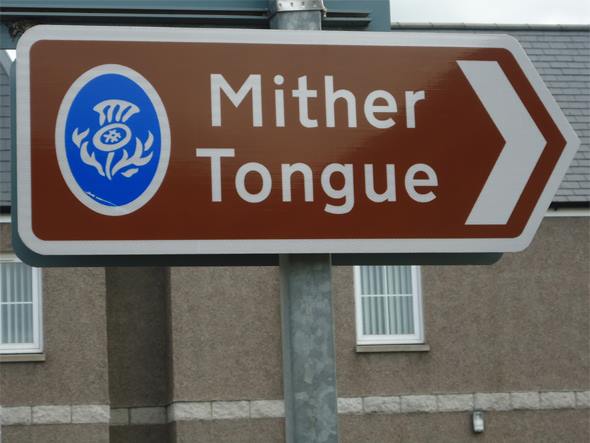 Keith, Moray
Keith, MorayWords that sound the same in Scots as in Scottish Standard English usually retain the same spelling e.g. come, door, for, hear, some, the, tongue and young etc., except where a Scots spelling has become established or the words have a different 'stressed' form, e.g. A (I), ma (my), thare and thaim etc.
In some words the spellings may differ slightly in order to accommodate the Scots pronunciation, e.g. lenth and strenth etc.
 Forfar, Angus
Forfar, AngusShort vowels are usually written with:
1. A final consonant or consonants i.e. buff, bak, ban, lib, licht, seck, tint, wat and wid etc.
2. Two consonants followed by <e> i.e. birse, carse, dulse, ense, girse, grilse, mense, merse and winze etc.
The spelling <a> for the vowel /a/ in words like aff, at, back, bak, bap, lat, rax, tak, tap, wad, wash and watch etc.
The spelling <e> for the vowel /ɛ/ in words like dern, ken, gled, ferm and yett etc.
A final lexical <e> is used to prevent verb homographs of plural nouns like brouse - brous, please - pleas and tease - teas etc.
 Edinburgh
EdinburghThe spelling <i> for the vowel /ɪ/ in words like bird, brig, find, kist, shilpit, whisper, will, wir, wird, wirm, wirthy and wittins etc. The pronunciation /ï/ (/æ̈/) also occurs in Antrim and /ɛ̈/ in some Northern dialects and Donegal. The pronunciation /ʌ/ may also occur, especially after <w> and <wh>. Some writers spell that <u>.
The spelling <u> for the vowel /ʌ/ in words like dubs, bull, drumly, hunder and pull etc.
Schwa /ə/ may be represented by <a, e, i, o> or <u> in unstressed positions i.e. aboot, the, oxter, loanin, bannock and smeddum.
 Strathaven, South Lanarkshire
Strathaven, South LanarkshireLong vowels are usually written with:
1. A single letter in the absence of a following consonant i.e. <e> in be and we /wi(ː)/, also /we(ː)/, <i> in wi /wi(ː)/ also /wɪ/ and /wə/. The <y> in by is often pronounced /bɪ/, /bi/ and /be/ (especially in the West and Ulster) also occurs. <o> in jo and no is usually pronounced /o(ː)/.
2. A single consonant followed by <e> i.e. bane, fere, bode and hure etc.
3. Two letters <au, aw, ae, ai, ay, ea, ee, ei, ie, oa, oo, ou> i.e. faw, glaur, snaw, brae, bairn, day, fear, weet, dreich, bield, gloam, hoose and broun etc., and very rarely <aa> in, for example, haar, and Insular Scots and caithness words derived fron Norn.
 Arbroath, Angus
Arbroath, AngusThe spelling <au> for the vowel, variously /ɑː/, /ɔː/ and /a(ː)/, is usually used initially and medially, giving: auld, cauld, caunle, draucht, haund, laund, saund and wauken etc.
The cluster <auld> is often pronounced /ʌul(d)/ in Ulster.
Note laund has an unstressed vowel in compounds and is spelled land e.g. hieland and Scotland etc.
 North Lanarkshire
North LanarkshireThe spelling <aw> is usually used finally for that vowel, giving: braw, draw, gnaw, law, maw, saw, and claw etc.
A few exceptions exist e.g. bawbie and bawsant.
The spelling <aw> is usually used for that vowel where Standard English cognates have <all>, giving: aw, awbody, baw, caw and haw etc.
Some writers use <aa> instead of <au> and <aw>, particularly when writing Northern and Insular Scots.
 Perth
PerthThe spelling <a> is usually used finally for that vowel in words like awa, twa and wha etc. In the south east that vowel may be pronounced /e/ in those words.
 Stewarton, East Ayrshire
Stewarton, East AyrshireThe spelling <a(consonant)e> usually used initially and medially for the vowel /e/ in words like ane, ance, bane, face, gate, hale, hame, lame, nane, Pace and stane etc.
In some northern dialects the cluster <ane> is pronounced /in/.
The spelling <ae> is usually used finally for that vowel, rarely medially, giving: ae, brae, frae, sae and strae, and faem and claes etc.
 Stewarton, East Ayrshire
Stewarton, East AyrshireThe spelling <ai> is used initially and medially for the vowel /e(ː)/, often /ɛ/, especially before /r/, giving: aiple, airm, bairn, braith, cairt, cairn, hain, jaiket, pairt, sair, shairp, stair and wairm etc.
 Liff, Angus
Liff, AngusThe spelling <ay> is usually used finally for that vowel, giving: day, gray, lay, pray and say etc.
 Lhanbryde, Moray
Lhanbryde, MorayThe spelling <ea> is used initially and medially in common with many Standard English cognates. Though in Standard English the spelling represents two pronunciations /i(ː)/ as in "meat" and /ɛ/ as in "head". In Scots the <ea> is usually pronounced either /i(ː)/ or /e(ː)/ depending on the lexeme or dialect, in words like beard, beast, creash, ease, east, eat, fear, gear, heap, lead v., meal, meat and read etc. The pronunciation /ɛ/ may occur before /r/ in words like early, earn, hearth, learn and pearl etc.
 Kinghorn, Fife
Kinghorn, FifeScots also uses the traditional digraph <ei> to represent those pronunciations, especially where Standard English cognates are spelled using <ea> as in Standard English "head", giving: deith, eild, eith, beir, breid, breinge, deid, deif, dreid, eleiven, heid, leid n., meidae, pleisur, seicont, seiven, sweir, teir v. and weir etc.
Some writers may use the spelling <ei> in all of the above.
The spelling <ea> is retained in words pronounced /ɛ/ in Scots and Scottish Standard English e.g. read (past tense). Some writers use <e> for that sound in all words.
The spelling <e(Consonant)e> is usually always pronounced /i(ː)/ e.g. here and fere etc.
 Selkirk, Borders
Selkirk, BordersThe spelling <ee> is pronounced /i(ː)/ in all Scots dialects, except in Southern Scots where root final it is /əi/, in words like een, freend, freet, neebour, neer, permeesion, see, wee, weel and weet etc.The digraph <ea> occasionally occurs in words like lea, plea and sea.
The spelling <ee> is retained in words pronounced the same in Scots and Scottish Standard English. e.g. creep, feel and seek etc.
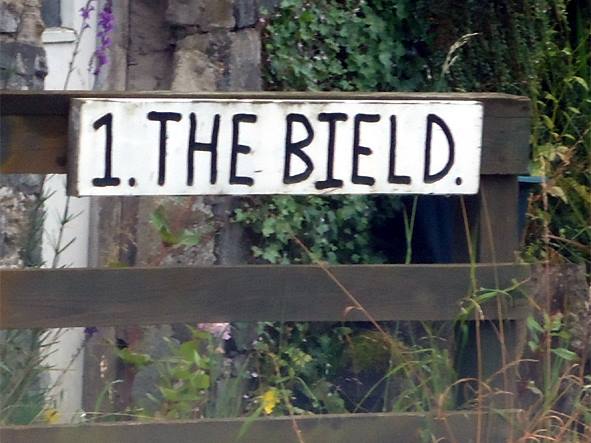 Traquair, Borders
Traquair, BordersThe spelling <ie> may also be used for that vowel, usually medially before <v>, <l> and in words shared with Standard English, giving: bield, chief, chield, lief, nieve, scrieve, shield and shielin etc.
The spelling <ie>, always /i(ː)/, is also used at the end some other words e.g. gie and hie etc.
Before <ch> (/x/) the spelling is often <ei> for that vowel, giving: dreich, heich, skeich and wheich etc.
The spelling <ei> may occasionaly be used in other words for that vowel, giving: deil, neist and speir etc.
For the above some writers variously use <ee>, <ei> or <ie>.
 Inverallochy, Aberdeenshire
Inverallochy, AberdeenshireThe spelling <ie> is traditionally used for diminutives giving: grannie, laddie, lassie, shappie and wifie etc.
The spellings <ie> and <y> are used for forming adjectives, adverbs and some nouns. <ie> tends to be used in particularly Scots words and <y> in words the same or similar to Standard English. <y> is usually used for adverbial endings giving: reekie, pernicketie, sairy, stany, stourie, brawly, bonnily, cannie, cannily, feckly, fully, geyly, likely, specially, sairly, shuirly and uncoly etc.
 Peterhead, Aberdeenshire
Peterhead, AberdeenshireThe pronunciation is usually /e/ in Central Scots dialects, but /i/ and /ɪ/ also occur. In Northern dialects, and East Perthshire a variation of /i/ and /ɪ/ occurs, where /i/ occurs when the preceding vowel is /i/ or /əi/, or the preceding consonant is /b, d, ð, g, v, ʒ/ or /z/. Otherwise /ɪ/.
The internal inconsistency caused by unpredictably using <ie> or <y> will be found on this site. Some writers simply use one or the other.
When forming the participle from verbs ending in <ie> the <ie> changes to <y> giving cairyin and couryin etc.
For the sake of orthographic consistency many writes use either <ie> or <y> in all those words.
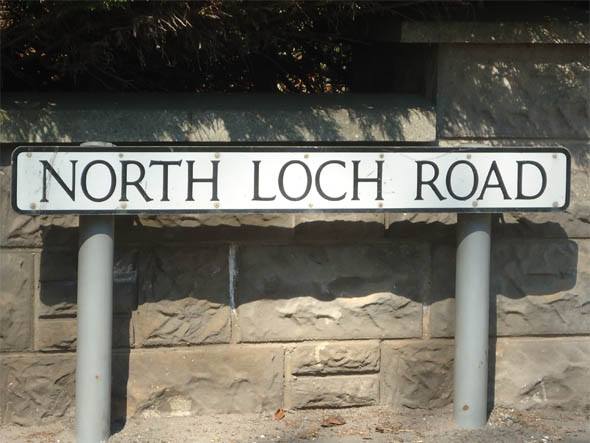 Forfar, Angus
Forfar, AngusThe spelling <oa> for the vowel /oː/ and <o> for the vowel /ɔ/. In many dialects /ɔ/ has merged with /o/ but some dialects retain the distinction between /oː/ and /ɔ/.
The distinction is usually retained in spelling, giving: boat, coal, foal, hoast, rose, and thole etc., and boss, box, cod, common, dochter, on, loch, nocht, rock and thocht etc. In Mid Northern Scots, after /k/, /wəi/ may occur e.g. coal and coat etc.
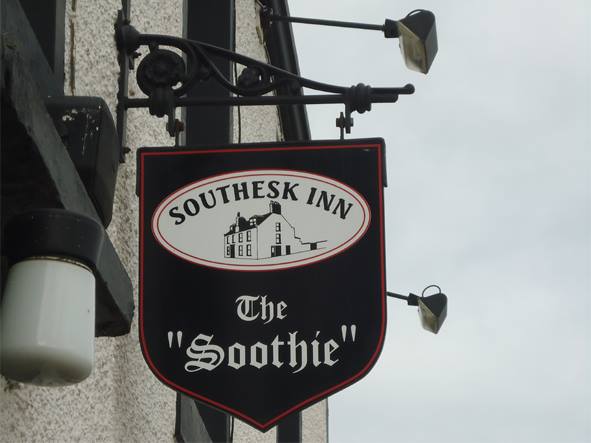 Montrose, Angus
Montrose, AngusThe spellings <ou> or <oo> are used for the vowel /uː/." In Southern Scots, when final, it is pronounced /ʌu/.
<oo> is used in words like hoose, aboot and soond in order to avoid confusing <ou> with the Standard English pronunciation.
 Glasgow
GlasgowThe traditional Scots spelling <ou> is used in all other words where confusion with the Standard English pronunciation is unlikely, giving: allou, brou, broun, bouk, cou, coum, cour, dou, doun, dout, fou, hou, nou, poupit, sou, thoum and you etc.
Some writers use either <ou> or <oo> for that vowel in all those words.
 Scots inscribed sugar bowl
Scots inscribed sugar bowlThe spelling <u(consonant)e> may occasionally be used for that vowel in words where the spelling is established e.g. dule and hure etc.
The spelling <ui> for the vowel, variously /øː/, /ɪ/ or /eː/, and /iː/, in words like guid, ruif, tuim, spuin, puir, juist and truith etc.
 Tranent, East Lothian
Tranent, East LothianThe spelling <eu> for the vowel, variously /øː/, /(j)u/ or /(j)ʌ/, in words like beuk, deuk, eneuch, teuch, leuk, teug, teuk, neuk and heuch etc.
 Culross, Fife
Culross, FifeThe spelling <ew> for the vowel /ju/ in words like dew, ewest, few, new, pewter, spew and tew etc. In Mid Northern Scots the pronunciation may be /jʌu/. Other spellings may also occur in a few words like beauty, duty, feu, fuel and peuther etc.
Diphthongs are usually written with two letters <i-e, y-e, ey, oi, oy, ow(e)> and <y(e)> etc.
 Tushielaw, Borders
Tushielaw, BordersThe spelling <i(consonant)e> for the diphthongs /əi/ and /aɪ/ in words pronounced similarly in Scots and Scottish Standard English e.g. wife, knife, thrice and lice but also bile and jine etc. Particularly Scots words are often spelled with the traditional Scots <y(consonant)e> e.g. dyke, fyle, syne and tyne, wynd etc. but <i> in mind (remember) and kind.
Some writers use <y(consonant)e> in all words with this diphthong.
 The Ards, County Down
The Ards, County DownThe spellings <y>, <ye>, <ey> are used for the word final for those diphthongs in words like aye (always), ay (yes), cley, gey, kye and wey etc.
The spelling <ey> occasionally represents /əi/ initially in words like eydent and eyster etc.
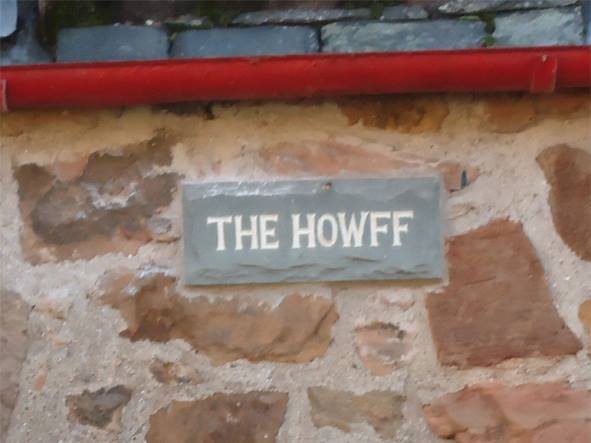 Crail, Fife
Crail, FifeThe spellings <ow> for the diphthong /ʌu/, <owe> finally, in words like growe, growthe, thowe, howff, dowie, fowk, lowp and cowp etc.
Before <k>, that diphthong may be vocalised to /o/ e.g. bowk, fowk and howk etc.
As in Standard English, in disyllabic words where the first syllable is stressed, the consonant following the single vowel in the first syllable is doubled giving blatter, watter, verra, fremmit, biggit, dizzen, donnert and butter etc.
 Arbroath, Angus
Arbroath, AngusThe following letters are not doubled <h, j, q, v, w, x,> and <y>.
Many verbs that end with a single consonant letter double it in the present and past participles, and past tense, as do some adjectives for the comparative and superlative i.e. drap - drappin - drappit, het - hetter - hettest.
<f, l, s> and <z> are usually doubled after short vowels i.e. baff, nyaff, dwall, mell, bass, bress and bizz etc.
Double consonants are avoided where simple differences to Standard English spelling exist.
Consonants are not usually doubled after long vowels and diphthongs i.e. ail, kail, gean, neep, heid, loan, heuk, stale and tyne etc.
The internal consonant in the past tense and past perfect of some verbs like sell, tell, spell and coff become single giving selt, telt, spelt and coft etc.
The spelling <ch> for /x/ in words like loch, dreich, brocht and nicht, except initially where it usually represents /ʧ/ in words like chield, cheetie and chowk or where it follows <r> in words like airch. Otherwise <tch> is usually used e.g. catch and pootch etc.
 Lough Swilly, County Donegal
Lough Swilly, County DonegalThe cluster <nch> is always pronounced /nʃ/ giving: brainch, clinch, dunch, hainch, inch, French, painch etc.
The spelling <c> for /s/ is usually used before the letters <e> and <i>. Such words are generally of Romance origin, giving: censor, ceevil, cedent, ceil and mediciner etc.
 Coupar Angus, Perth and Kinross
Coupar Angus, Perth and KinrossInitial <c> for /k/ is usually used:
Before vowels, spelled <a>, <ai>, <au>, <aw>, <o>, <oa>, <oo>, <ou> and <u>,
before the vowel (a few exceptions) spelled <ui>,
before the diphthong spelled <ow> or <owe>,
before <l> and <r>,
giving caw, caddie, carle, caird, cairt, cleid, creash, cou, cloot, croun, coff, corrupt, cosy, coast, cruldge, cushat, cowp, cowt, cley, crine, cuist and cuit etc.
 Abernethy, Perth and Kinross
Abernethy, Perth and KinrossInitial <k> is usually used:
Before the vowels spelled <e> and <ei>, <ee> and <ea> and <i>.
A few exceptions with the vowels spelled <ai> and <ae>, and <ui> exist,
before the diphthong spelled <i(consonant)e> and <y(consonant)e>,
before <n>,
giving keek, keeng, kebbock, Keith, kelter, ken, kirk, kye, kyte, kythe, kail, kaim and knife etc.
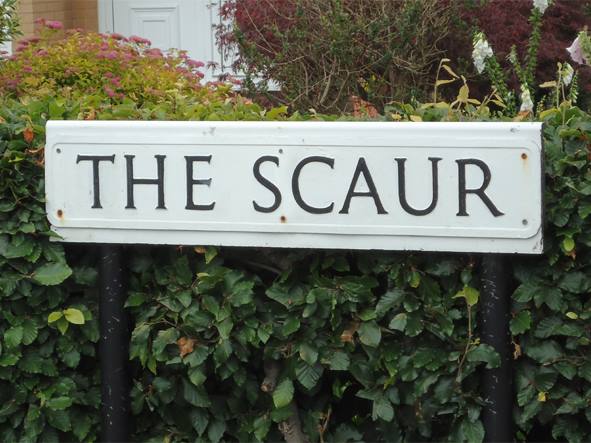 Longtown, Cumbria
Longtown, CumbriaInitial <sc> for /sk/ is usually used:
Before the vowels, spelled <a>, <au>, <aw>, <oo>, <ou>, <o>, <oa>, <u> and <ui>,
before the diphthong spelled <ow> and <owe>,
before <l> and <r>,
giving scantlins, sclaff, sclate, scaud, scaur, scaw, sclent, scone, scoor, scowe, scowth, scunner, scrieve and scuip etc.
 Gatehouse of Fleet, Dumfries and Galloway
Gatehouse of Fleet, Dumfries and GallowayInitial <sk> is usually used:
Before vowels spelled <ai>, <ae> and <a(consonant)e>,
before the diphthong spelled <i(consonant)e> and <y(consonant)e>,
giving skail, skaith, skelf, skelp, skeel, skirl, skive, skime and skite etc.
Medial and terminal <ck> is used in words like beck, brickle, feck, muckle and puddock etc.
The terminal <le> is used in words like dreeble, muckle, souple and trauchle. That is changed to <elt> in the past tense and past participle to give soupelt and trauchelt etc. Exceptions such as aiverel, cavel, raivel and traivel also exist.
 Carnwath, South Lanarkshire
Carnwath, South LanarkshireIn Many dialects the terminal <d> of <nd> and <ld> is usually silent but is often pronounced in the derived forms (especially past tenses) of many words. In order to achieve orthographic consistency such words are spelled with the <nd>, e.g. haund and soond, and haundit and soondit. Entries in dictionaries often include the terminal <d> in brackets, e.g. haun(d), soon(d), sen(d).
In many words the final <d> of a medial <nd> is also silent. Many words no longer have the <d> pronounced at all. Such words are now spelled using a medial <nn> or <n>.
Here spellings like bind, blind, find and wind are considered adequate for representing the vowel /ɪ/. Some writers use spellings like finn(d) in order to show the Scots pronunciation.
 Scots inscribed porridge bowl
Scots inscribed porridge bowlThe initial <th> in thanks, thing, awthing and think is often pronounced /h/.
The final <g> in thing is often silent. It is used in writing because the final <ing> is not the suffix for the gerund or present participle. This word is cognate with German Ding and Scandinavian ting.
Final <the> to indicate the voiced consonant /ð/ in bathe, kythe, laithe and skaithe etc.
The pronunciation /s/ or /z/ for final <s> or contracted and genitive forms with <'s> or <s'>.
The pronunciation /s/ usually occurs after /f/, /k/, /p/, /s/, /t/, /θ/ and /x/ and before an inflexion.
e.g. laifs, wifes, wife's, hooses, lochs and threaps etc.
The pronunciation /z/ usually occurs in plurals ending with <es> and after a vowel sound or /b/, /d/, /g/, /l/, /m/, /n/, /r/, /v/, /ð/ and /ŋ/.
e.g. dous, haunds, ludges, steams, gie's, his, hers and thairs etc.
Final <ss> is usually pronounced /s/ e.g. miss, bliss, bress, uiss and wiss etc.
Final <se> is more complicated and it may be worthwhile consulting a pronunciation dictionary.
Final <se> is usually pronounced /s/ after short vowels /l/, /n/, /p/ and (long vowels before) /r/.
e.g. coorse, grilse, hoose, manse, mense and traipse. etc.
Final <se> is usually pronounced /z/ after long vowels and diphthongs e.g. jalouse, lowse, phrase, please and uise etc.
<z> for /z/ is seldom used in Scots, though it does occur in some words as a substitute for the older <Ȝ> (yogh) representing the pronunciations /ŋ/, /ŋj/ and /nj/. <lʒ> became /lj/. This has led to a number of variants using the spellings <z>, <y>, <n> and <ng>.
e.g. brulzie - brulyie, gaberlunzie - gaberlunyie, senzie - senyie, Cockenzie - Cockennie, Mackenzie - Mackennie and Menzies - Mingis etc.
Glottal stops /ʔ/ are not indicated in writing. Many speakers substitute a glottal stop for /t/ and sometimes /k/ and /p/, between two vowels.
Silent Letters
As described above, some letters in Scots words are not pronounced.
 Ayr, South Ayrshire
Ayr, South AyrshireThe <t> after medial <ch> /x/, in medial <st> and before final <en>.
The <t> in <ct> and <pt>.
These are often written <ck> and <p> although the <t> is often pronounced in derived forms.
Note the following exceptions:
 Dunlop, East Ayrshire
Dunlop, East AyrshireIn many words a <d> after <n> and <l> may be silent.
Standard English and Scots Cognates
Many Scots and Standard English words are derived by direct descent from the same source. Some insights into the spelling of Scots may be gained by comparing the spelling of Scots words to the spellings of their Standard English cognates. There are of course exceptions to the 'rules' explained here.
These comparisons in no way imply that Standard English is a 'corrupted' form of Scots!
Different Consonants
 Broxburn, West Lothian
Broxburn, West LothianScots has no 'b' in the accented or any following syllable, where Standard English has it after <m>.
Note
As previously mentioned the final <d> after <n> is usually silent. In many words the historic <d> in medial positions is not pronounced. In such words the spelling <n> or <nn> is used.
Scots often has no final 'f' where Standard English does.
 Leven, Fife
Leven, FifeScots often has no medial and final 'v' where Standard English does.
In some words Scots has no final 'th', where Standard English does.
Letter Differences
In some words Scots has <dd> where Standard English has <th>.
 North Berwick, East Lothian
North Berwick, East LothianScots often has <k> or <ck> where Standard English has <ch>. The Scots <k> or <ck> is often claimed to be of Scandinavian origin.
Note: such sic.
Scots often has <scl> where Standard English has <sl>.
Scots often has <sk> where Standard English has <sh>.
 Forth, South Lanarkshire
Forth, South LanarkshireScots often has <g> or <gg> where Standard English has <dge>.
Note the exceptions hedge hedge and sledge sled.
 Edinburgh
EdinburghScots often has <au> where Standard English has <al>.
Note stalk, talk and walk.
 The Barras, Glasgow
The Barras, GlasgowScots usually has <aw> where Standard English has final <all>.
 Bankshill, Dumfries and Galloway
Bankshill, Dumfries and GallowayScots often has <ow> medially and <owe> finally, where Standard English has <ol(l)>.
Note the exception: soldier sodger.
 Wellbank, Angus
Wellbank, AngusScots often has <aul> where Standard English has <ol>.
Note the exceptions:
 Portlethen, Aberdeenshire
Portlethen, AberdeenshireIn Scots the position of <r> is often switched compared to the preceding or following vowel in Standard English.
Scots often has a pronunciation variation between /ʃ/ and /s/ in many words of Norman French origin. These words may be spelled using <s>, <c> or <sh>.
The <ual> in some words may be pronounced /wəl/.
In some words of Latin origin, Scots has kept the original pronunciation /i(ː)/ where Standard English has /ɪ/ or /aɪ/.
Note. system seestem.
Scots often has <-fee> where Standard English has <-fy>.
Scots often has <i> where Standard English has <u>.
 Lerwick, Shetland
Lerwick, ShetlandScots often has <e> where Standard English has <a>.
 Scots inscribed butter dish
Scots inscribed butter dishScots often has <ai> where Standard English has <a>. Especially in words with <r> + consonant.
 Selkirk, Borders
Selkirk, BordersScots often has <a> where Standard English has <o>.
 Alyth, Perth and Kinross
Alyth, Perth and KinrossScots often has <a(consonant)e> where Standard English has <o(consonant)e>.
 Buckie, Moray
Buckie, MorayNote the exceptions in <ai>.
Scots often has <ee> where Standard English has <e>.
Note the exception red reid.
Scots often has <u> or <i> after <wh> and <w> where Standard English has <e>, <i>, or <o>.
Scots often has <i-e> where Standard English has <oi>.
Note.
 Kelso, Borders
Kelso, BordersScots has <ch> /x/ where Standard English has <gh>.
Most dialects of Scots have a German like Ich/Ach rule governing the pronunciation of <ch>. <ch> is pronounced /ç/ following a front vowel, and /x/ following a back vowel. For the sake of simplicity /x/ has been throughout this site.
Note the exception, delight comes from Old French deliter. The Standard English spelling arose by analogy with light. The word is not pronounced delicht in Scots and is written (and pronounced) delite.
Burgh retains the <gh> in Scots.
 Auchmithie, Angus
Auchmithie, AngusScots often has <oo> where Standard English has <ou>.
Scots often has <u> where Standard English has <ou>.
Among the exceptions are:
 Ayr, South Ayrshire
Ayr, South AyrshireScots often has <ou> where Standard English has <ow> medially.
 Carnoustie, Angus
Carnoustie, AngusIn some words Scots often has final <aw> where Standard English has final <ow>.
 Ayr, South Ayrshire
Ayr, South AyrshireIn some words Scots often has final <ae> where Standard English has final <ow>.
Similarly in some words Scots often has final <ae> where Standard English has final <a>.
 Midlothian
MidlothianIn some words Scots has <ou> where Standard English has final <ow>.
Exceptions to the above are:
 East Ayrshire
East AyrshireThe Old English long <o> /oː/ became /ø/ and /y/ in older Scots, then spelled <ui> and <u(Consonant)e> respectively. Now generally spelled <ui> or <eu> (see below) in Modern Scots and usually <oo> in Standard English. Similarly with Scandinavian and Romance words.
This remains /ø(ː)/ and /y(ː)/ in peripheral dialects. In parts of Fife, Angus and Ulster /e(ː)/ occurs. In northern dialects and parts of Ulster /i(ː)/ occurs, where in Mid Northern Scots after /g/ and /k/ it is /wi(ː)/. In Central Scots and parts of Ulster it became /ɪ/ when short and /eː/ when long.
 Dundee
DundeeIn some of the above the Central Scots pronunciation has established itself in the spelling.
e.g. do dae, did did, done duin and does daes or dis.
Some words descended from the long <o> now have <i>.
Note. wood wid, not descended from long <o>.
The Old English long <o> /oː/ was followed by /k/ or /x/ the sound shifted to <eu> in many Scots dialects. Pronounced /(j)u/ or /(j)ʌ/ depending on dialect.
Similarly with Scandinavian words.
 Langholm, Dumfries & Galloway
Langholm, Dumfries & GallowayNote (sparrow) speug, tug teug.
In some words Scots has no final <e> as in Standard English <ure>.
Note secure siccar.
In many words Scots has initial <a> where Standard English has <be>.
